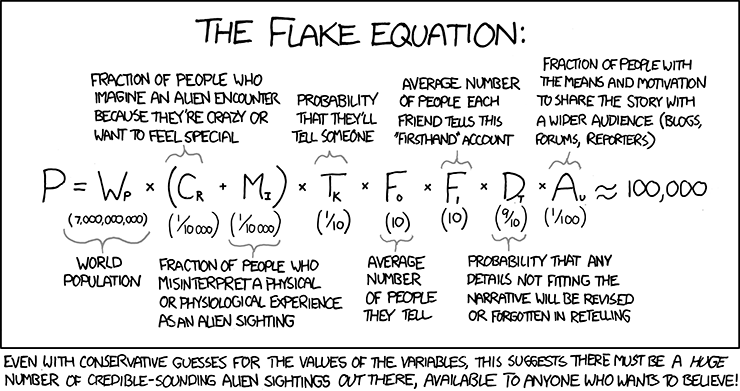Notes on Rationality and the Loch Ness Monster
Recently, xkcd ran this comic:
Steven Novella followed it up with a post on his NeuroLogica Blog, and concludes that:
The take home message for skeptics is that even in a world without ghosts, aliens, and bigfeet we would expect there to be large numbers of anecdotes that sound very impressive, told by people who seem sincere. In a world with these things, we should also expect some objective and verifiable evidence – and that is what is lacking.
The notion of “where there is smoke there is fire” simply does not apply, because human brains and the cultures in which they are embedded are smoke machines. (Link)
Now, I like to consider myself a burgeoning skeptic and overall rational person. I am an atheist and accept that there is nothing about the universe that is supernatural, only operations and systems that we don’t understand yet. There is no Loch Ness monster. I know this. I accept this. But damn it, I really, really wish there was. Same for aliens visiting our world and Bigfoot and ghosts and time travel and any number of cultural fictions that, while powerful, do not have material evidence for their actuality. But most of all, I want to live in a world where the Loch Ness monster exists, even though she doesn’t. (Not sure why she’s a she in my head, but always has been.) I think, probably, because such a world would seem to me somehow richer, more magical, yet tinged with a sense of tragedy–one lonely serpent monster cut off from her kind through eons of time. Whenever I say (and I’ve said this on a number of occasions), “I don’t believe in the Loch Ness monster, but I really wish I did,” I am wishing for a particular story to be true, to be tangible.
The desire for a more magical world seems to me one of the principle reasons why some people cling so hard to stories of monsters and aliens and fairies and conspiracies. Such concepts and stories offer excitement and wonder. Perhaps, for some, they offer a glimpse of the sublime: that overwhelming feeling of joy and wonder and fear and smallness annealed into an emotion that takes you out of yourself and returns you a changed, even if only slightly, person. However, I wonder if using fictional beasts and aliens to create such an emotion is simply being lazy. When looking around at the material world that surrounds us, when really looking, we are always already surrounded by beauty and strangeness and seemingly-alien life forms. Is Loch Ness really more impressive than the giant squid or the Blue Whale? Are aliens really more interesting than the biodiversity contained within a single Redwood tree? Can there be anything more exciting and humbling than a crystalline desert sky at night and truly understanding just how small you are in the universe; than letting yourself know that you are not separate from that vastness but part of the warp and woof of a universe that contains secrets and splendors enough to occupy our species for all of our existence?
I may want to believe in the Loch Ness monster, but that is partly because I don’t seek out, nearly as much as I ought to, those secrets and splendors that do exist. Instead of reading about UFOs and the Bermuda Triangle when I was a kid, how much richer my life would be if I had read about archaeology and oceanography; biology and astronomy? I’m not saying that my interest in certain topics was wrong or that I shouldn’t have read Chariots of the Gods when I was twelve. I merely wonder what kind of path I might have taken if I’d spent more time reading about and learning about the strangeness of our actual world. That said, it becomes important for scientists and skeptics and rationalists to provide equally compelling stories about the world as those told by the flakes and the kooks and those who are merely desperate in their desire for a magic world that excites and astounds without all the tedious mucking about in reality. Thus the importance of people like Jacques Cousteau, Carl Sagan, and Neal deGrasse Tyson. Scientists and story-tellers need to work with and learn from each other so that our science and skepticism can be told about with compelling narrative and our compelling narratives can be told with the richness and wonder of the natural world.
I may never entirely leave behind my wish to live in the same world as the Loch Ness monster. I don’t think that’s a bad thing as long as I understand that it is the story of Loch Ness monster that intrigues me, and that her non-existence does not drain that story of meaning or importance.
Because the Loch Ness monster does not exist.
And I’m ok with that.
On this day..
- Great Links of Fire! - 2009

I have been to Loch Ness. It is a beautiful and majestic loch… much like so many other lochs in Scotland: Birnie and Tay and Morar and Awe. It’s sort of skinny, like a lot of lochs, and the road runs right next to it, so you can watch it as you drive along.
I watched the loch.
I saw no monsters.
I still hold out hope for Sasquatch.